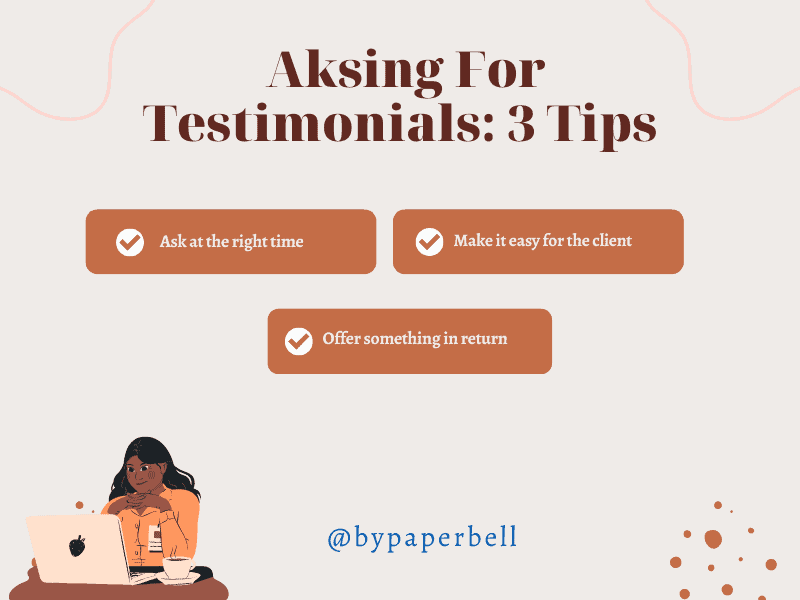A potential client is on your website and reading about all the wonderful things you can do for them.
They are so amazed by your services that it almost sounds too good to be true unless you have some powerful client testimonials to back it up.
Let’s explore how you can ask for client testimonials to increase your credibility and convert more leads into contracts. As a bonus, we’ll share some email templates you can use immediately.
What Is a Client Testimonial?
Customer testimonials are statements from your past or existing coaching clients that describe their experience with your service. They can be written statements or video recordings.
Some testimonials are written by your client from scratch. Others are written based on a draft, a set of questions, or a questionnaire that you share with them. This helps your client spend less time crafting their testimonial and gets you the exact format you want.
When writing the testimonial, you can highlight the most valuable parts of your client’s testimony. For example, the results they got from working with you or how their life has changed after the coaching process was completed.
In some cases, clients may prefer to provide their testimonials in their own words, which can add to the authenticity of their statement. In this case, you can create a guide for them on how to draft their story or some best practices for filming video testimonials.
You can emphasize the transformation they experienced so that other potential clients will get an idea of what’s possible if they decide to work with you.
💡 Pro Tip: Want to make collecting testimonials even easier? With Paperbell, you can set up automated follow-up emails that are sent to clients after they complete a package. This way, you’ll never forget to ask for a testimonial when the experience is still fresh in their minds.
Why Customer Testimonials Are Important
As a coach, positive testimonials should play a huge part in your marketing strategy.
Not everyone is going to jive with your coaching style. Testimonials allow you to showcase to potential customers what it’s like to work with you, from the point of view of people who’ve experienced it.
Of course, you should also paint a picture of what it’s like to work with you in your website’s copywriting. But a dedicated testimonial page adds a layer of credibility and social proof to your online presence that website copy can’t do on its own.
It’s one thing to say you can provide transformational experiences as a coach, and it’s another to proudly display customer testimonials from those who’ve lived through those transformations and can testify to that.
The bigger the claims you make on your website, the more likely you’ll need a testimonial page to back those claims up.
Showing off positive client reviews that reflect your target audience is a fantastic way to tap into that network. A potential client will want in on that action if people they relate to are raving about your services.
You can also use your best testimonials to create engaging content for your audience and attract potential customers. For instance, you can:
- Turn a testimonial into a pin on Pinterest.
- Publish it on other social media platforms.
- Add a short one to your business cards.
- Or use one to draft an effective Facebook ad.
A video testimonial is an especially powerful asset to be repurposed into promotional content for your business.
Here’s an example of Paperbell’s video testimonial:
How to Ask for a Testimonial
Testimonials rarely come to you organically; you normally need to ask for them. It’s not because clients aren’t impressed with your coaching, but most people don’t automatically think of writing a review — and let’s be honest, we’re too busy to do so unless we’re nudged a bit.
If a client writes you an email with a testimonial without being asked, amazing! If they don’t, it’s better to ask them to complete a questionnaire.
If you collect testimonials in a form or a video testimonial app, you won’t burden your client with the task of drafting copy., you won’t burden your client with the burden of drafting a copy. All they need to do is answer your questions in a few words. Then, it will be your job to draft quality testimonials based on those answers.
If you’re wondering how to ask for customer stories, here’s an example of an email template you can send your clients. Remember to change the wording to reflect your style and brand.
Hi [first-name],
I’ve really enjoyed working together, and I hope we can do it again in the future.
I was wondering if you would be open to sharing a testimonial about your experience working with me.
To make things easier, you can just fill out this quick form. Then, I’ll turn your answers into a testimonial and send it to you for approval.
[Form button]
I would really appreciate it if you could also share a headshot of your choice that I can feature on my website and social media, along with your words.
Thank you for your support!
[Signoff]
Questions for Requesting a Testimonial
So, what questions should you put in a testimonial form?
Testimonial forms are different from discovery session forms. They should focus on the experience and results your client received. Ideally, prospects should learn the measurable benefits of working with you after reading it.
They’re also an opportunity to learn what you can do better and how you can improve your services.
Here are ten questions you can add to your questionnaire:
1. How did you find out about my coaching services?
2. What was going on in your life/business when you made the decision to work with me? What challenges were you facing?
3. What else did you try to overcome your challenges before you worked with me? What happened?
4. What made you choose to work with me to overcome these challenges? How did my coaching services stand out?
5. What has been the biggest breakthrough you’ve experienced while working with me?
6. What has been your favorite thing about working with me so far?
7. What has been your LEAST favorite thing about working with me so far?
8. How would you describe my coaching service to someone else?
9. Is there anything you wish I had done differently?
10. Would you recommend this coaching service to a friend? If so, can you explain why?
Remember that you should ask open-ended questions (questions that can’t just be answered with a yes or a no) to get the most out of your testimonial requests. You don’t have to ask too many questions because it could overwhelm your client. Instead, you can choose a few from the list to ask for honest feedback and positive statements.
Your main goal here is to share customer success stories and perhaps get useful feedback from your past clients. So, if you ask them what was the best and least favorite part of working with you, it’s more than enough. You don’t want to make it feel like work to write you a testimonial.
Keeping your message short will encourage most clients to respond. If they don’t, it’s also okay to politely follow up to remind them of your request.
Free Testimonial Templates
So, your client has just filled out your questionnaire. Now, how do we turn it into an impressive testimonial?
Try using these two templates to banish writer’s block:
Angle: Overcoming a Challenge
[A short sentence about your client’s challenges or past experiences.]
[How you helped the client overcome this challenge.]
[What their life is like now.]
Here’s an example of what this can look like:
Before working with Tasha, I felt like I was walking through my life without a purpose and wasting my days. Tasha helped me flip everything around and rediscover my deeper why and sense of self. Now I feel like I know exactly where I’m going, all thanks to her!
Angle: Loving the Experience
[A sentence about how they loved working with you.]
[How your coaching style helped them.]
[A final statement on something specific you did for them.]
Here’s an example of what this can look like:
I loved working with Sandy. Her no-nonsense approach made it so much easier to launch my business. Not only did she deliver on guiding me step-by-step, she even personally wrote a mission statement that I resonate with so much. Thank you, Sandy!
Angle: Loving the Results
[A sentence about how working with you got the best results.]
[A statement about their goal and how you helped them achieve it.]
I achieved fantastic results through working with Joseph; he helped me go from being unclear and unfocused to landing my dream job. I couldn’t have done it without him!
Make sure you ask your client’s permission to use their full name and a link to their website if they have one.
The more detail you add about your clients, the more credible their testimonials will be for your new leads. It allows them to verify that the person who wrote the statement is real, and reassure themselves that you have integrity.
Unfortunately, several online brands have used freelance marketplaces like Upwork and Fiverr to pay for fake video testimonials. That’s why linking to a real person’s website can help you gain the trust of potential clients who want to do their due diligence.
One more thing…
Never publish a testimonial without your client’s consent. If you’re drafting it yourself, make sure they read and approve it before you use it anywhere. The last thing you’d want is to misuse their trust and write a testimonial that doesn’t represent their experience.
Customer Testimonial Examples
Not sure what a raving testimonial from a happy customer should look like? Check the websites of the life coaches you look up to see what their clients are saying about them.
If you have a favorite coach you follow, check out their testimonial section for inspiration on the client experience. You can also use these captivating client testimonials as a starting point:
Maggie Edwards: “I found ‘my way out’ of my problems and focused on things that mattered to me the most. I’ve gained clarity, confidence, and I’m happier now.”
Preston Smiles: “Bridge made me confront my limiting mindset. I used to be a serial procrastinator and was always saying ‘when I…’ or ‘if I ever…’ when I really just needed to put my plans into action, no excuses. Six months ago I used to dream about owning my own design business and now I’m in the fourth month of my business, running successfully alongside my day job. So much gratitude!”
Melissa Ambrosini: “Melissa is a wonderful example of someone who is absolutely real, can speak from the heart and is brave enough to draw upon and openly share her own personal experiences to prove that self belief is the modern woman’s most valuable practice.”
Merel Kriegsman: “I’ve surpassed my money goal 20x and will very likely get to 7-figures this year. I’m deeply moved when I look at the numbers I aimed for only a year ago. With Merel’s help, I’ve surpassed those numbers 20x and will very likely get to 7-figures this year, and I have more time freedom than ever. UPDATE: She did it.”
Marie Forleo: “Marie is that mentor we’ve been wishing for who spoke our language, understands our struggles & gives sound advice that we can apply without even knowing us in person!”
[ Read: The 16 World’s Best Life Coaches (And Why They’re So Popular)]
Three Tips to Get a ‘Yes’ From Clients When You Request Testimonials

There’s no guarantee of success when asking clients for testimonials, but there are things you can do to improve your chances.
1. Pick the Right Time
The secret to getting powerful testimonials is timing.
New clients may not be ready to vouch for you just yet. On the other hand, a client who’s just expressed how much they’ve grown with you in your final session together can definitely back you up.
Plan ahead to send out your questionnaire at the right time. You can also set up a reminder in your calendar or make it a part of your offboarding process.
Reaching out to past clients you haven’t spoken to in a while is also okay. In this case, you can ask them how their life has changed for the better since you parted ways.
2. Make It Easy for Them
When you request testimonials, you’re asking for a favor. Make sure the process is simple and effortless for them.
At the beginning of the testimonial form, you should let them know approximately how long it will take them to complete it. The last thing you want is for them to give up halfway through without submitting their answers.
You can also consider giving them an alternative option when requesting testimonials. They might respond more to your request if they can film a short video testimonial on their phone or write it up without filling out your form. Another option is to ask them the questions over a Zoom meeting (sort of like an interview) and film their testimonial (with their permission, of course).
If you’re communicating in text messages, you can use business text messaging tools like Whatsapp or Voxer to ask for feedback about your services. If they respond with a positive testimonial, you can use a screen grab of the message for your website’s testimonial page (with their consent).
3. Offer Them Something in Return
Offering an incentive to your client for filling out your questionnaire can give them some extra motivation to get back to you.
A backlink to their website, a cup of coffee, or a discount for future services could be the difference between a snappy “yes” and a “maybe later”.
Offering a small gesture like this isn’t the same as paying for testimonials. That’s not just unethical but also a black hat SEO strategy that will result in your website being penalized by Google.
Finally, don’t forget to say thank you.
FAQs About Client Testimonials
What Can You Do If a Client Isn’t Giving You Feedback?
Follow up with a friendly reminder email. If they’re too busy, ask permission to quote a breakthrough moment from your sessions instead. If they still don’t respond, respect their choice and focus on other clients.
Can You Edit Your Client’s Testimonial?
You can modify your client’s testimonial. Just ask for their approval before you share the edited version anywhere. Editing a testimonial may be necessary if the review is too wordy, has writing errors, or contains information irrelevant to your coaching business.
The aim is not to change the overall meaning of their review. Even if, as their coach, you know about certain developments in their life, it’s better to ask them to share it in their own words rather than making it up for them.
How Should My Testimonial Page Look Like?
There are different templates you can use for displaying testimonials on your website.
The most common way to feature written testimonials on your website is to add a slider to your home page or services page. You can duplicate the same website block on multiple pages to give better visibility to your positive reviews.
Your video testimonials can also get their own slider or static grid on your website. You can host them on a dedicated YouTube channel and embed them into your page to improve your site speed. This way, you can also feature your customer stories on an additional platform.
Can I Share the Case Studies of My Clients?
Case studies of your coaching clients can be shared anonymously without any specific details that would make it easy to identify them. They shouldn’t be treated as testimonials, where your clients are featured as real people recommending your services.
Increase Your Credibility by Asking for Testimonials
Asking for client testimonials is a great way to earn the trust of prospects who land on your website. Try our template to get raving reviews about your services and attract new clients.
Paperbell makes creating and sharing testimonial questionnaires with your clients even easier. Plus, it handles your entire client management workflow, from contracts to payments and more. Grab your free account here – no credit card needed.

Editor’s Note: This post was originally published in April 2023 and has since been updated for accuracy.









